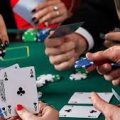
Casino gambling provides an engaging, immersive experience that can serve as an effective emotional regulation tool. Gamers can use casino gambling to escape real-life challenges and unwind for a time – but it is essential that they develop self-control strategies in order to avoid making impulsive decisions that lead to financial losses.
One method of managing emotions is through mindfulness techniques, which have been proven to reduce stress and enhance decision-making abilities. Another strategy involves tracking gambling behavior and setting clear limits.
Gaming can be a powerful tool for emotional regulation
Gamers often turn to gaming as an outlet for emotional regulation. By employing various strategies to manage urges and practice emotional regulation skills through regular gaming, gamers may even develop stronger emotional management strategies such as using the STOP technique (breathing deeply while focusing on an object) or keeping a journal or practicing mindfulness.
Previous studies have demonstrated that gambling cognitions are closely tied with emotional/motivational aspects of impulsivity than with cognitive impulsivity. Furthermore, several studies have linked gambling cognitions more strongly with maladaptive emotion regulation mechanisms and maladaptive emotion regulation mechanisms are linked with gambling. The current research confirms these findings by showing shame at present and in the past as well as blame are associated with various gambling motives while perspective taking and reappraisal are related to gambling cognitions.
Anger is a common emotion experienced by gamblers
Anger is an understandable reaction for those engaging in high-stakes gambling, especially where significant sums of money are at stake. This feeling often stems from the illusion of control where gamblers believe their skills and actions can influence outcomes even though these games largely rely on chance, leading them to feel frustrated or even outraged when results don’t live up to expectations.
This study investigated the relationships among gambling severity, shame and blame, gambling motives as well as emotion regulation ability such as self-blame, social and coping strategies, acceptance and positive reappraisal in terms of emotional regulation ability. Results demonstrated that self-blame was involved in linking gambling severity with shame within two weeks; moreover slot-machine gamblers felt negative emotions more intensely than casino or scratch card gamblers.
Mindfulness techniques can help regulate emotions
Mindfulness techniques can help those struggling with gambling issues regulate their emotions. Such techniques, which include deep breathing or visualisation techniques, have proven successful at relieving anxiety and stress as well as controlling impulsive behavior such as excessive gambling.
One study conducted by researchers evaluated a treatment for Generalized Anxiety Disorder that employed strategies of emotion regulation. Participants of this research reported significant reduction in symptoms after receiving this therapy; however, due to limited sample sizes and overrepresentation by males this research had several limitations that should be noted.
The Five Facets of Mindfulness Questionnaire (FOMQ) is an instrument for measuring trait mindfulness. This measurement tool comprises five distinct aspects – Observing, Describing, Nonjudgemental Judging and Nonreactivity Reactivity – commonly utilized in psychology research studies.
Tracking gambling behavior can help regulate emotions
Monitoring your gambling behavior is vitally important to preventing you from losing control of your emotions. Monitoring also allows you to create healthy coping strategies in the future that may help alleviate negative emotion states like anxiety and depression – this development of skills is necessary in recovering from gambling addiction.
In this study, a mediation analysis was used to explore the relationship between emotion regulation difficulties and gambling outcome expectancies among regular gamblers in a community sample. A multiple mediation model was tested using SPSS’ bootstrap procedure (Hayes 2022). Findings indicated that escape and excitement outcome expectancies partially mediate this relationship while direct effects through escape are insignificant.
Setting clear limits can help regulate emotions
Staying organized helps gamblers avoid emotional impulses and make more rational decisions when gambling, including setting financial and time limits for gambling sessions, tracking their progress and isolating gambling funds from personal finances – which reduces stress levels as it helps prevent players from depleting essential expenses to fund gambling sessions.
Researchers recently conducted a study aimed at investigating variations in emotion regulation strategies among various forms of gambling, specifically scratch, slot and casino gambling. Researchers discovered that scratch gamblers were less impacted by negative emotions while more motivated by coping strategies than slot and casino gamblers.
Researchers discovered that shame’s relationship to gambling severity was moderated by emotion regulation abilities such as self-blame, acceptance and rumination – suggesting that emotional regulation abilities play an integral part in effective treatment for gambling disorders.










